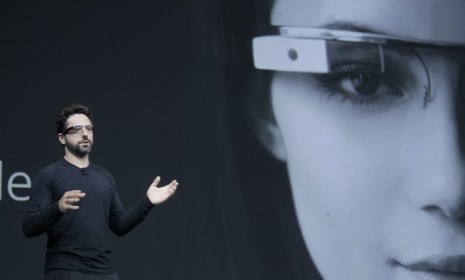'iGlass': Could Apple top Google's computerized specs?
Not to be outdone by a chief rival, the House That Jobs Built nabs a patent for its own set of futuristic glasses

A free daily email with the biggest news stories of the day – and the best features from TheWeek.com
You are now subscribed
Your newsletter sign-up was successful
Google hopes that its Project Glass — computerized specs that, come 2014, will reportedly allow a wearer to use vocal commands to send instant messages, look up directions, snap photos, and video chat with friends — will reinvent the way we use computers and be hugely profitable for Android. But Google isn't alone. Earlier this week, Apple was granted patent approval for a "peripheral treatment for head-mounted displays," which sounds an awful lot like Google's own computerized specs, but with a few twists. Here, a brief guide to what bloggers are dubbing everything from "iGlass" to "iShades":
What did Apple get approval for, exactly?
Unlike Google's heads-up display (HUD) that presents information right in front of one eye, Apple's theoretical head-mounted display (HMD) would use small LCD projectors to beam computerized images onto a pair of lenses, which would be attached to a helmet, glasses, or some type of visor. While Google Glass sits off to the side of one lens, Apple's dual projection displays would create "stereoscopic 3D images" to give the wearer a "comfortable, immersive viewing experience," says Christina Bonnington at Wired. In theory, this type of all-encompassing viewfinder would help prevent motion sickness and "enable the specs to greatly fill the user's field of view and increase the quality of the image," says Jesus Diaz at Gizmodo.
The Week
Escape your echo chamber. Get the facts behind the news, plus analysis from multiple perspectives.

Sign up for The Week's Free Newsletters
From our morning news briefing to a weekly Good News Newsletter, get the best of The Week delivered directly to your inbox.
From our morning news briefing to a weekly Good News Newsletter, get the best of The Week delivered directly to your inbox.
How would an Apple headset work?
That's unclear, but the interface would presumably resemble that of an iPhone. One Apple watcher tells Forbes that Apple's "huge advantage" over Google in the headset realm would be its superior artificial intelligence and voice interface, Siri, which could be used to issue hands-free commands.
Who would use it?
A head-mounted, hands-free computer could have a number of useful applications in a range of industries, and could be appealing to the likes of surgeons, military personnel, firefighters, police offers, scientists, and engineers, says Salvadaor Rodriguez at the Los Angeles Times.
A free daily email with the biggest news stories of the day – and the best features from TheWeek.com
What does that mean for Google?
Not much, for now. iGlass is just at the patent stage, and there's no guarantee that it will ever be a widely available commercial product. Google, on the other hand, already has "some hardware," says Diaz, "even if it's just beta-quality, ultra-expensive, and only does a tiny fraction of all the magical things the company initially told us it would do."
Sources: Boy Genius Report, Forbes, Gizmodo, Los Angeles Times, Wired